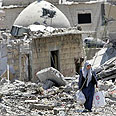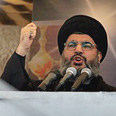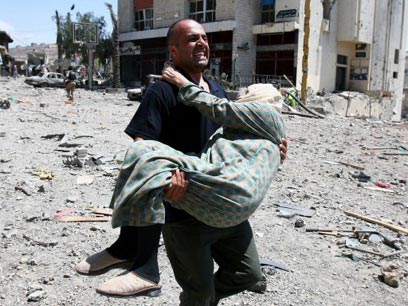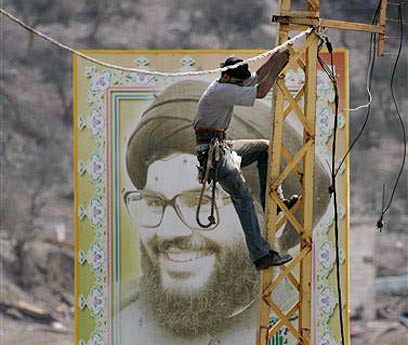


They supported Hizbullah during the war - whether by free will or the constraints of the times – and Hizbullah promised them no end in compensation for their loyalty. But now the residents of southern Lebanon say they feel abandoned by the organization that swore to rebuild their homes and lives.
Umm Qasem had just finished preparing lunch for her family on July 12th when a Hizbullah fighter burst into her home in the southern Lebanese town of Bint Jbeil and instructed the family to flee their home at once. His organization has just seized two Israeli soldiers, he announced, and a harsh retaliation was expected.
Umm Qasem remained silent, and her family decided to stay. Had she decided differently her fate would likely have been different. During the war she lost two of her sons and her house on the same day. At the time, she was quick to respond, saying that this was "deliverance in the name of the 'Sayyed' (Hizbullah chief Hassan Nasrallah's nickname)."
But now, seven months after the war the rhetoric seems to have changed. Umm Qasem, and with her numerous other residents of southern Lebanon are no longer afraid to question the necessity of Hizbullah's action to kidnap the Israeli soldiers.
The critique is implied, hesitant, but outside Lebanon's borders it is clear and desive. A recent article in the London-based 'Al-Hayat' newspaper focused on the issue of bringing different voices from southern Lebanon.
The paper shed light on the stories of residents who lost their homes and businesses, and who struggled to cope with the cold winter; forgotten while Hizbullah focused its efforts on waging political battle against Prime Minister Fouad Siniora in Beirut.

Bint Jbeil during the war (Photo: Reuters)
'Deliverance in the name of the Sayyed,' said the residents, is no longer the most popular saying. Residents also told the paper they believed that after the Israel's withdrawal in 2000, they never believed they would see the IDF again.
“The ‘Sayyed’ promised us that our homes would never be destroyed, and that our sons would never be killed. We removed the concept of ‘war’ from out inner dictionary, and suddenly, war broke out,” said Hassan, a southern villager, while standing on the ruins of what used to be his home.
Hizbullah corruption
And what about the compensation they promised Lebanese citizens? Hizbullah did in fact distribute some $10,000 in reparations to every family to rent a furnished apartment for one year, but this is not nearly sufficient and residents are still waiting for the compensation promised by the Siniora administration, turning their bitterness towards him.
Piles of ruins remain, and there is no sign of their impending removal. Regional council chairman for the of Bint Jbeil area tried to explain: “The reason for delaying the removal of the debris is an agreement by which Bint Jbeil will be built out of the same type of stone that was used in the past. It must retain its character. Qatar took it upon itself to rebuild the houses out the very same stones rather than give the money directly to the people.”
But this isn’t the only reason for the tough criticism of Hizbullah. The group, which is heading a political battle against Siniora’s government in Beirut, is naturally less present in the south. “The ‘Resistance’ youth (Hizbullah) provided us with food and water during the war. Thanks to the ‘Resistance’, south Lebanon was liberated and we could hold our heads high among the Arabs,” Bint Jbeil resident Um Hussein explained. In the same breath she added: “But we don’t see them anymore. After the war they forgot us and went to Beirut. They forgot the south and started seeking power.”
Others fear Hizbullah is discriminating against them regarding dispensing reparation money. Haj Bazi, who was in Bint Jbeil during the war with his family, lost his home and two shops under his ownership. Besides the immediate aid, he hasn’t gotten any more money, and he sees both Hizbullah and the government responsible for the situation.
“After the war, there was not a single one of us left who wasn’t hurt in some way. We looked death in the eye, and we’re living with a great deal of suffering,” he says. He claims Hizbullah isn’t handing out compensation in a uniform fashion. “We wouldn’t have thought Hizbullah’s leaders would hold onto wealth, but those left here have been compensated not nearly worth half of what they lost,” he said.

Enjoyed massive support during war (Photo: AP)
Hizbullah spokesperson Hussein Rahaal completely rejected the criticism. “It may be the (compensation) committees have made mistakes, but we always correct our mistakes,” he said.
Ali, who owns a candy and clothing stand, criticized Siniora and Hizbullah both. “The state doesn’t know that there’s a village called Bint Jbeil that suffered more than the rest. None of them visited us. We don’t trust them. A few opposition members (Hizbullah parliamentarians) came to visit but then disappeared. None of them listened to our requests. I don’t know what’s worse – the coalition or the opposition,” Ali said.
He got $400 “as a present for the store I lost”, and he isn’t afraid to slam Hizbullah. “They have other concerns. They’re busy in Beirut,” he said.
Funding Hizbullah’s rivals
Bold criticism of Hizbullah and Iran’s support of the Lebanese group was heard this week in Iran itself. “On the one hand, supporting Hizbullah isn’t just a question of monetary support, but supporting your brothers. On the other hand, due to the poor economic state (in Iran), many Iranians have started to think twice and wonder – how does Iran benefit from this aid?” an Iranian youth told London-based pan-Arab newspaper a-Sharq al-Awsat, under condition of anonymity.
Recalling the Iran-Iraq war, he said: “Why are we determined to deal with Arab problems? I still remember when I was young, my mother sent me and my sister to the cellar so we wouldn’t hear the sound of Saddam Hussein’s rockets flying overhead.”
However, regarding Lebanon, it appears that there is more than meets the eye. Experts and retired intelligence agents told Reuters that all the Gulf nations, and Saudi Arabia in particular, funnel money to radical Islamic-Sunni groups in Lebanon to strengthen the Sunni’s stance against Hizbullah.
The experts noted that the funding started last December, to gather power against Hizbullah and “as part of Saudi Arabia’s effort to strengthen Sunni Islam in the developing conflict against Shiites in the Middle East and Africa.”
“Saudi money flows to radical Sunni groups with one sole purpose – to stand against the Shiites and Hizbullah in Lebanon,” they said.
What is Iran’s view of the matter? Iran’s deputy Foreign Minister Mahdi Mustafa told a-Sharq al-Awsat that his nation supports Hizbullah only “from the moral and diplomatic perspective.”
Regarding funds provided by Iran, which is suffering economic hardship, Mustafa explained that the aid was sent by individuals to Hizbullah, not through the state. “Iranians have always supported Hizbullah on an individual and volunteer basis,” he clarified.















